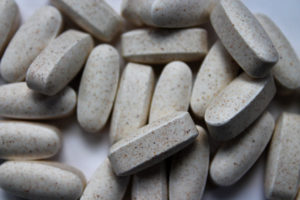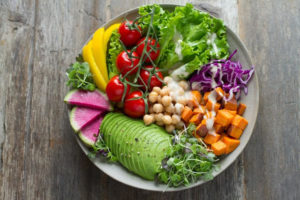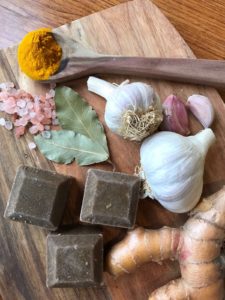In our previous blog “What is Inflammation, Exactly?”, we explored the mechanisms behind inflammation, types of inflammation, and most importantly the risk factors and health conditions, associated with chronic inflammation.
The cliff notes from that blog were that chronic inflammation has deleterious effects on the body and is a key factor causing almost all chronic degenerative diseases. In this blog let’s explore some of the most effective ways to prevent chronic inflammation, this happens through avoiding certain habits and committing to others.
Firstly Avoid Or Minimise The Following:
1. Simple Sugars, Refined Carbohydrates, High-Glycaemic Foods.
 Some of the worst inflammatory foods include:
Some of the worst inflammatory foods include:
- refined white sugar
- processed foods
- vegetable oils and other harmful fats
dairy - wheat products
- non-organic, non-fermented soy
A diet high in sugar and refined carbs (processed grain products which break down into sugar just the same in the body) increases our levels of inflammation, along with our risk for inflammatory diseases and symptoms like poor immune response1.
In fact, research shows that sugar consumption is associated with inflammatory diseases like diabetes, rheumatoid arthritis, stroke, and cardiovascular disease. In addition, levels of C-reactive protein (an inflammation marker) and inflammatory chemicals are higher in people that consume sugary beverages like sodas regularly and high amounts of sugar and fructose corn syrup in a diet.2,3
What are refined carbohydrates? They are grain-based foods that have the bran and germ extracted during processing. The process of refining a food not only removes the fibre, but it also removes much of the food’s nutritional value, including B-complex vitamins, healthy oils, and fat-soluble vitamins. Most breads, cereals, and pasta are refined as is white rice. Cakes, cookies, crackers, pie, candy, and chips are all examples of refined snack foods.
What’s more, animal studies show that a diet high in sugar can counteract the helpful, anti-inflammatory benefits of omega-3 fatty acid consumption4. Therefore, if you want to fight inflammation, it’s not enough to just include antioxidant-rich and anti-inflammatory foods but we also need to watch the number of refined carbs and sugar we are getting in our diet.
 2. Saturated fat, and trans fats (hydrogenated oils)
2. Saturated fat, and trans fats (hydrogenated oils)
Some dietary saturated and certainly synthetic trans-fats, aggravate inflammation. Processed, packaged foods and “baked” goods that contain trans fats (made from processed seed and vegetable oils, also known as hydrogenated vegetable oils) and items like margarine, should all be removed or reduced in the diet.
While omega-3 polyunsaturated fats appear to be anti-inflammatory.
3. Alcohol
Alcohol can increase acid production in the stomach and may lead to heartburn, acid reflux and stomach ulcers. Alcohol has also been associated with inflammatory bowel diseases, leaky gut, and harmful changes in gut bacteria. Excessive alcohol consumption has been linked to bleeding in the gastrointestinal tract. Reducing your consumption of alcohol may help your digestion.
4. Stress
Managing inflammation demands that you manage stress. Being constantly on edge or otherwise in the “fight-or-flight” mode can fuel the inflammatory fires, which messes with your gut and brain axis. Why is this? When you are stressed, your body produces more catecholamines (alarm signals), which disrupts everything including the balance of “good” and “bad” bugs in your gut microbiome, to the “leakiness” of your intestinal lining. When your gut lining becomes leakier, it allows a harmful product of bacterial death in the gut—endotoxin—to enter the circulation and light up your immune system. Therefore, stress can exacerbate all the symptoms of inflammation you may be experiencing in your body.
Ever notice you feel achier when you’re stressed? Stress fuels inflammation, which then fuels more stress-induced by uncomfortable symptoms. To turn it back around, we need to take control of our inflammation and heal our gut, stress management is a necessity, not a luxury. Chronic psychological stress is linked to a greater risk for depression, heart disease and the body loses its ability to regulate the inflammatory response and normal defense mechanisms.
Inflammation and oxidative stress are two sides of the same coin. At its most basic level, oxidation is the loss of electrons. When an atom or compound is oxidized, its properties change. For example, unoxidized iron is a strong, structurally sound metal, while oxidized iron is a brittle, reddish powder. This process occurs constantly in our environment and naturally within our bodies. Free radicals and other Reactive Oxygen Species (ROS) are derived either from normal essential metabolic processes in the human body (such as the metabolism of oxygen within our mitochondria), or from external sources such as exposure to X-rays, ozone, cigarette smoking, air pollutants, and industrial chemicals.
Oxidative stress is the term used to describe when the critical balance between free radical generation (the bad guys) and antioxidant defenses (the good guys) is tipped, with an excess of free radicles causing oxidative damage. Research indicates that oxidative stress is an underlying cause of many health challenges and diseases including everything from base level inflammation to cardiovascular and kidney disease. Interestingly it also plays a role in miscarriage and complication in pregnancy. It has also been connected to central nervous system diseases such as Alzheimer’s and other dementias, cardiovascular disease, autoimmune diseases, cancer, cataracts, and early aging.
When oxidation increases in your body, it causes more inflammation, and when inflammation increases, it causes more oxidative stress. Antioxidants are the number one defense against oxidative stress in your body.5
Another common cause of inflammation is chemicals, especially the ones that are airborne or irritants. Your skin can absorb certain cosmetics and air fresheners, which can be responsible for inflammation. Mild exposure to workplace chemicals or even everyday cleaning products can cause inflammation along with pollutants in the air you breathe.
While some toxins are environmental, we can reduce our exposure and our contribution to the overall emissions of toxins by making some simple lifestyle shifts. The first step would be getting rid of the products in your home that contain synthetic fragrance and other harsh chemical ingredients. This includes things like air fresheners, dryer sheets, scented candles, laundry detergent, dish soap, perfume, and more. Remember, there are always natural alternatives to these products.
7. Antibiotics, NSAIDs, Corticosteroids, Heartburn medications, and Birth Control
The use of antibiotics, NSAIDsantacids, and should be minimised or avoided where possible. Leaky gut is a common intestinal issue that results from poor diet, stress, food allergies, and it now seems that certain medications can cause leaky gut too. Research suggests that they harm the microbiome in the gut causing inflammation in intestinal walls known as leaky gut which in turn releases toxins and triggers chronic, body-wide inflammation.
 Antibiotics for example are typically overprescribed and are best utilised only when necessary as they can have negative impacts. Not only do they deplete your natural and beneficial gut bacteria, but they contribute to the development of antibiotic-resistant bacteria. When the good bacteria in your gut become depleted, harmful strains can grow and spread. This causes a condition known as SIBO (small intestinal bacterial overgrowth) or candida overgrowth. The result is chronic gut inflammation and damage to the gut wall, which leads to leaky gut.
Antibiotics for example are typically overprescribed and are best utilised only when necessary as they can have negative impacts. Not only do they deplete your natural and beneficial gut bacteria, but they contribute to the development of antibiotic-resistant bacteria. When the good bacteria in your gut become depleted, harmful strains can grow and spread. This causes a condition known as SIBO (small intestinal bacterial overgrowth) or candida overgrowth. The result is chronic gut inflammation and damage to the gut wall, which leads to leaky gut.
Focus on boosting your immune strength to fight infections. If however, you do get a strong infection that requires antibiotics, be sure to take high-quality, multi-strain probiotics along with it. This will keep the balance in your gut healthy and protect it from gut wall damage.
NSAIDs like ibuprofen, are commonly taken to reduce fevers and pain have been found to disrupt the balance of your gut microbiome, a condition known as dysbiosis. Despite being safe in small doses, larger doses (which are common with inflammatory conditions) can lead to gastrointestinal bleeding, inflammation, and leaky gut.
Corticosteroids are often used in autoimmune conditions to suppress immune system function. But the suppression of the immune system causes leaky gut, which in turn leads to and contributes to autoimmunity. This means that while steroids are prescribed to help with autoimmunity, they are in fact making the condition worse.
Heartburn and acid reflux are the most common digestive issues in this country, mostly as a result of the western diet. As a result, antacids and other acid-reducing medications are commonly prescribed and used. These drugs work to reduce acid production, but this allows for a certain bacteria, C. difficile, to thrive. This may cause colon swelling, life-threatening intestinal bleeding, and leaky gut. While acid reflux is uncomfortable and can cause other issues, you need to weigh the benefits against these cons. Controlling acid reflux can be done with diet changes and reducing stress.
With so many women relying on oral contraceptives, it’s important to know that these drugs can also cause a leaky gut. By increasing the levels of estrogen in your body, these pills increase the risk of candida overgrowth. Once this yeast gets out of control and spreads, it can contribute to gut wall damage and a leaky gut. More women taking birth control also report frequent gastrointestinal issues, which could be a result of the estrogen levels. Gastrointestinal issues can be associated with inflammation, which could damage the gut lining and also cause a leaky gut to develop.
8.Quit Smoking.
Cigarette smoking lowers the production of anti-inflammatory molecules and instigates inflammation of the arteries and other systems in the body.
Focus On And Increase The Following:
There’s truth to the adage “you are what you eat” It’s especially relevant when managing inflammation and reducing swelling in your joints. While some foods make things worse as we’ve seen, there are plenty that help to quell inflammation.
To reduce levels of inflammation, aim for an overall healthy diet. If you’re looking for an eating plan that closely follows the tenets of anti-inflammatory eating, consider the Mediterranean diet, which is high in fruits, vegetables, nuts, whole grains, fish, and healthy oils. In addition to lowering inflammation, a more natural, less processed diet can have noticeable effects on your physical and emotional health.
Consuming whole grains, natural foods, plenty of vegetables and fruits such as avocados, cherries, kale, and fatty fish like salmon is helpful in defeating inflammation. See more information on dietary changes you can do below.
2. Antioxidant-Rich Foods
Compounds, which can be found in a variety of plant foods, calm the oxidative process, and halt the breakdown of cells and tissues that can result from oxidation. At the same time, antioxidants can protect your body from inflammation and assist in repairing tissue that’s been damaged by an overactive inflammatory response6,7.
Fruits and vegetables such as blueberries, apples, brussels sprouts, cabbage, broccoli, cauliflower, cherries and cherry juice, avocados mushrooms (like portobello and shiitake) and tomatoes are high in natural antioxidants and polyphenols, and other anti-inflammatory compounds, that may protect against inflammation.
Nuts such as almonds are associated with lowering the risk of cardiovascular disease and diabetes. While fibre, in general, has a high intake of dietary soluble, and insoluble fibre, is associated with lowering levels of IL-6 and TNF-alpha both of which are pro-inflammatory cytokines.
3. Omega-3 Fats
Every cell in your body is made up of a membrane that’s composed of fatty acids. This fatty acid membrane is responsible for the fluidity of our cells (what comes in and out) and determines the type of signaling molecules that the cell releases. Cells involved in inflammation and that signal inflammatory chemicals tend to be abundant in omega-6 fatty acids. Cells involved in the anti-inflammatory response, however, tend to be abundant in omega-3 fatty acids.
The Western diet is disproportionately high in omega-6 to omega-3 fats, which is one reason that we see so many inflammatory diseases in the US. But the good news is, in order to change the composition of your cell membranes (from inflammatory to anti-inflammatory), we just need to consume more omega-3 fatty acids. Foods rich in omega-3s include: fatty fish like salmon, mackerel, herring, sea bass, sardines, and shellfish (oysters, shrimp). Some vegan options are seaweed, algae, hemp seeds, flax seeds, tofu, edamame, Kidney beans, navy beans, mung beans, walnuts, and avocados.
 It should be noted that vegan sources of omega-3’s are not as bioavailable, so going with an algae-based omega-3 supplement may be your best bet.
It should be noted that vegan sources of omega-3’s are not as bioavailable, so going with an algae-based omega-3 supplement may be your best bet.
The 3 principal omega-3 fatty acids are:
Alpha-Linolenic Acids (ALAs) – found in plant foods
Eicosapentaenoic Acid (EPA) – found in fish and seafood
Docosahexaenoic Acid (DHA) – found in fish and seafood
Be mindful that recommend fish oils, can readily become rancid and inflammatory. Especially if they are a cheap source. These are very sensitive, volatile oils that go rancid easily in the production process. I much prefer the consumption of fatty fish to get adequate levels of omega-3 in the diet over-supplementation to avoid this common issue. The irony can be that so many health-conscious consumers are they’re trying to reduce inflammation with these supplements but end up causing inflammation.
So there you have it, while chronic inflammation may seem omnipresent in our modern world, there is a lot we can do to combat and minimise it. The benefit is a body that can run efficiently without having to divert attention to putting out inflammatory fires.
4. Micronutrients: Magnesium, vitamin D, vitamin E, zinc and selenium are some of the best anti-inflammatories. Magnesium is listed as one of the most anti-inflammatory dietary factors, and its intake is associated with the lowering of hsCRP, IL-6, and TNF-alpha activity. Vitamin D exerts its anti-inflammatory activity by suppressing inflammatory mediators such as prostaglandins and nuclear factor kappa-light- chain-enhancer of activated B cells.13
Vitamin E, zinc, and selenium also act as antioxidants in the body. While sesame lignans found in sesame oil, reduces the synthesis of prostaglandin, leukotrienes, and thromboxanes and is known for its potential to lower blood pressure.14
5. Anti-Inflammatory Herbs and Supplements
Mother nature has provided us with an abundance of plants that contain potent anti-inflammatory compounds. By including these herbs, spices, and foods into our diet and supplement regimen, we offer our body an incredible defense against inflammation. Some of the most potent anti-inflammatory plants include:15

- Broccoli sprouts
- Turmeric/ Curcumin
- Moringa
- Green tea, Black tea
- Garlic
- Ginger
- Black pepper
- Cayenne
- Clove
Curcumin is a constituent of turmeric and has been shown to be associated with significant improvement in several inflammatory diseases in animal models.16
While there is some research to suggest the following:15 Green and black tea polyphenols are associated with a reduction in CRP in human clinical studies. Resveratrol, found in grape skin and red wine, has been shown to improve blood vessel function and slow aging in rats. Pomegranate juice appears to decrease atherosclerosis development in mice with high cholesterol. Garlic may improve blood vessel functioning in the hearts of rats with high blood pressure.
- Devil’s claw
- Cat’s claw
- Turmeric
- Mangosteen
- Frankincense
- Willow bark
6. Exercise regularly and maintain your ideal weight.
Many dietary and lifestyle changes may be helpful in removing inflammation triggers and reducing chronic inflammation. The most effective is weight loss. Unhealthy foods contribute to weight gain, which is itself a risk factor for inflammation. It is largely known that adipose tissue in obese or overweight individuals induces low-grade systemic inflammation. Regular exercise is helpful not only in controlling weight but also decreasing the risk of cardiovascular diseases and strengthening the heart, muscles, and bones.
Physical exercise has an interesting effect on inflammation and oxidation. After you work out, your levels of inflammatory chemicals actually rise, along with a rise in oxidative stress. After this acute post-workout phase, however, the oxidative stress subsides, and anti-inflammatory chemicals are increased to calm the inflammation. We know that these benefits of exercise outweigh the costs, but there is merely an initial rise in inflammation, which is why you have soreness and even pain following your attempt at being a weekend warrior. Over the few days and the long term following a workout, research shows that regular exercise is associated with a decrease in C-reactive protein and inflammatory cytokines (chemical messengers)8.
Overnight sleep (ideally at least 7 to 8 hours) helps stimulating human growth hormones and testosterone in the body to rebuild itself.9
8. Support Your Liver
Supporting our liver’s ability to clear unwanted compounds from our body is absolutely crucial for a healthy inflammatory and immune response. Our liver is the primary organ responsible for removing toxins like heavy metals, chemicals, drugs, viruses, mold, bacteria, and other pathogens from our body. These harmful compounds and pathogens instigate inflammation and drive our immune responses. 10,11
What’s more, whether we realize it or not, our liver plays a significant role in immunity. It not only processes harmless molecules that enter our circulation, but it keeps an eye out for anything potentially harmful and contains its own repertoire of immune cells12.
As the immune system combats and clears a virus or pathogen, it creates a lot of debris the liver must process and metabolize. Thus, if our liver is under-functioning, it can take longer to recover from illness.
Many people consider the liver to be the hardest working organ in our body – it’s responsible for hundreds of critical functions in your body. Giving it some love every now and then is not enough. Caring for our liver to be one of the priorities if we need or want to reduce inflammation, improve immunity, and improve conditions and symptoms.
In health,
Dr. Jennifer Barham-Floreani,
Bach. Chiropractic, Bach. App Clinical Science
Registered internationally, no longer practicing as a chiropractor in Australia.
Wilem Floreani,
Research Assistant & Student
Barcelona College of Chiropractic
References:
- Buyken, Anette E., et al. “Carbohydrate nutrition and inflammatory disease mortality in older adults.”The American journal of clinical nutrition92.3 (2010): 634-643.
- de Koning, Lawrence, et al. “Sweetened beverage consumption, incident coronary heart disease, and biomarkers of risk in men.”Circulation125.14 (2012): 1735-1741.
- Hu, Yang, et al. “Sugar-sweetened soda consumption and risk of developing rheumatoid arthritis in women.”The American journal of clinical nutrition100.3 (2014): 959-967.
- Ma, Tao, et al. “Sucrose counteracts the anti-inflammatory effect of fish oil in adipose tissue and increases obesity development in mice.”PloS one6.6 (2011).
- Chatterjee, Shampa. “Oxidative stress, inflammation, and disease.”Oxidative stress and biomaterials. Academic Press, 2016. 35-58.
- Arulselvan, Palanisamy, et al. “Role of antioxidants and natural products in inflammation.”Oxidative medicine and cellular longevity2016 (2016).
- Grimble, R. F. “Nutritional antioxidants and the modulation of inflammation: theory and practice.”New horizons (Baltimore, Md.)2.2 (1994): 175-185.
- Teixeira-Lemos, Edite, et al. “Regular physical exercise training assists in preventing type 2 diabetes development: focus on its antioxidant and anti-inflammatory properties.”Cardiovascular diabetology10.1 (2011): 12.
- Kline, Christopher E. “The bidirectional relationship between exercise and sleep: implications for exercise adherence and sleep improvement.”American journal of lifestyle medicine8.6 (2014): 375-379.
- Knolle, Percy A., and Guido Gerken. “Local control of the immune response in the liver.”Immunological reviews174.1 (2000): 21-34.
- Van Lookeren Campagne, Menno, and Admar Verschoor. “Pathogen clearance and immune adherence “revisited”: immuno-regulatory roles for CRIg.”Seminars in immunology. Vol. 37. Academic Press, 2018.
- Robinson, Mark W., Cathal Harmon, and Cliona O’Farrelly. “Liver immunology and its role in inflammation and homeostasis.”Cellular & molecular immunology13.3 (2016): 267-276.
- Pahwa R, Goyal A, Bansal P, et al. Chronic Inflammation. [Updated 2020 Jul 4]. In: StatPearls [Internet]. Treasure Island (FL): StatPearls Publishing; 2020 Jan-. Available from: https:// www.ncbi.nlm.nih.gov/books/NBK493173/
- Ritama Biswas. Til (Sesamum indicum L.) – An Underexploited but Promising Oilseed with Multifarious Applications: A Review. December 2018 International Journal of Bioresource Science 5(2)
- a)Kandola, A (5 February 2019). Which herbs help reduce inflammation? https://www.medicalnewstoday.com/articles/324368#turmeric
b)Terry, R, Posadzki, P, Watson, LK, & Ernst, E (2011). The Use of Ginger (Zingiber officinale) for the Treatment of Pain: A Systematic Review of Clinical Trials. Pain Medicine, Volume 12, Issue 12, December 2011, Pages 1808–1818
c)Singh, Rashmi et al (2010). “Green tea polyphenol epigallocatechin-3-gallate: inflammation and arthritis[corrected]”. Life sciences vol. 86,25-26 (2010): 907-18. doi:10.1016/j.lfs.2010.04.013 - Kuptniratsaikul V, Thanakhumtorn S, Chinswangwatanakul P, Wattanamongkonsil L, & Thamlikitkul V (2009). Efficacy and safety of Curcuma domestica extracts in patients with knee osteoarthritis. J Altern Complement Med. 2009 Aug;15(8):891-7. doi: 10.1089/acm.2008.0186. PMID: 19678780.
- Fiebich BL, Heinrich M, Hiller KO, & Kammerer N (2001). Inhibition of TNF-alpha synthesis in LPS-stimulated primary human monocytes by Harpagophytum extract SteiHap 69. Phytomedicine. 2001 Jan;8(1):28-30. doi: 10.1078/0944-7113-00002. PMID: 11292236.








